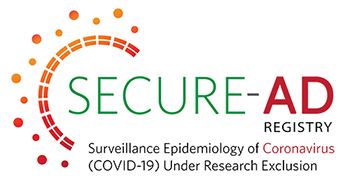SECURE-AD RegistryThe emerging and evolving coronavirus disease 2019 (COVID-19) pandemic has created a global public health emergency1. There is an urgent need to understand the underlying determinants of the outcome of COVID-19 and how this translates to individuals who are treated with immunomodulating medications. This information will be vital for informing assessments of risk of COVID-19 in individuals who are treated with systemic immunomodulation medication and for guiding clinical decision making around their treatments. Atopic dermatitis (AD) is a common chronic inflammatory disease, with a lifetime prevalence of 15–30% in children and 2–10% in adults2. Patients with moderate-to-severe AD are often treated with long-term systemic immunomodulating therapy3. The impact of these immunomodulating medications on COVID-19 outcomes is currently unknown. SECURE-AD (Surveillance Epidemiology of Corona Virus (COVID-19) Under Research Exclusion – Atopic Dermatitis; www.covidderm.org) is a secure, online, de-identified international reporting registry for health care providers to report outcomes of COVID-19 in AD patients who have been Covid-19 infected or where such an infection has been strongly suspected. We are interested in ALL AD patients, whether treated with systemic immunomodulating medication or not. By collecting worldwide observational data on cases of COVID-19 in AD patients treated with and without systemic immunomodulating therapy, the SECURE-AD registry will enable description of the impact of COVID-19 on these patients and how factors such as age, comorbidities, and AD systemic immunomodulating treatments impact COVID-19 outcomes. Through broadscale participation and collaboration the data collected through the SECURE-AD registry will benefit the entire AD patient population and international clinical community. SECURE-AD is closely aligned with recently established partner databases for outcomes to COVID-19 in other immune-mediated inflammatory diseases (such as www.covidibd.org, www.psoprotect.org and www.rheum-covid.org). We will continue to collaborate closely with these research teams in order to facilitate valuable cross-disease analyses. |

